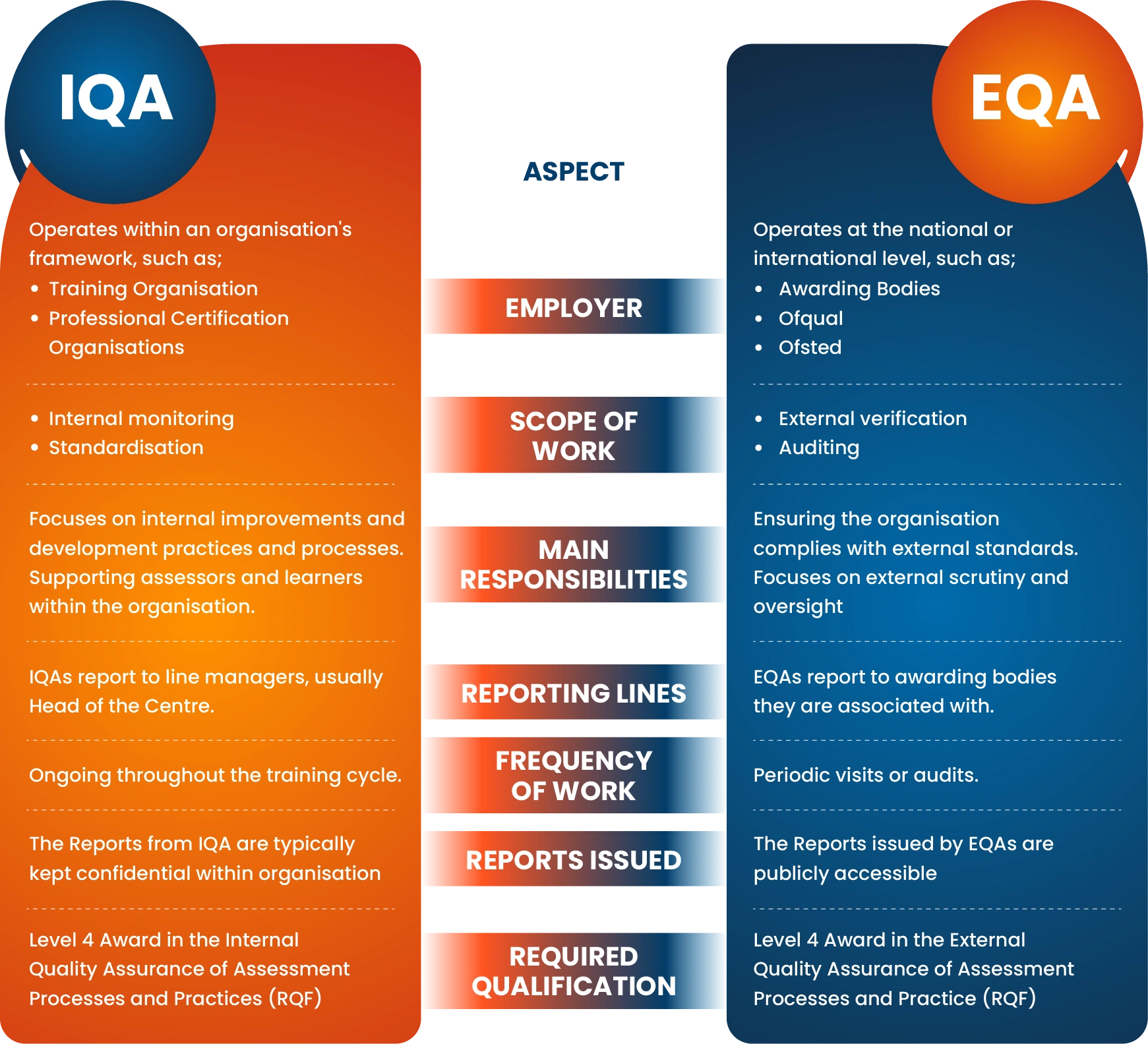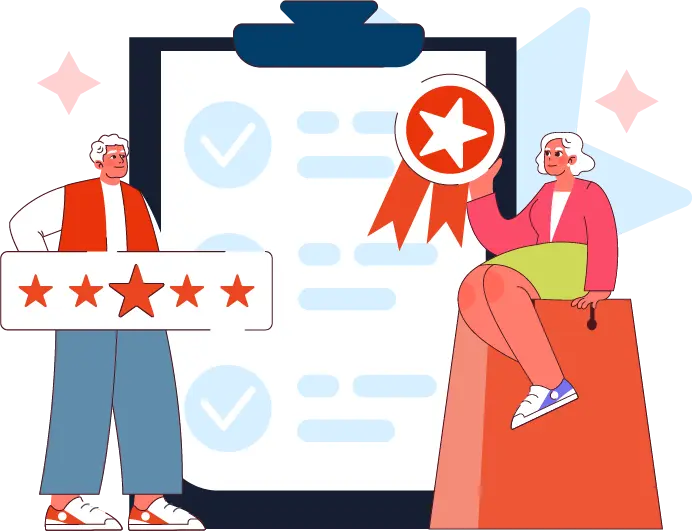Understanding the difference between internal quality assurance (IQA) and external quality assurance (EQA) is important as their roles are quite distinct. They are equally critical in upholding high standards in quality assurance procedures and assessment practices.
Key Takeaways:
- QAs focus on internally verifying the processes and practices of an organisation, while EQAs externally verify compliance with awarding body standards.
- IQAs and EQAs collaborate to maintain assessment integrity, regulatory compliance, and continuous improvement.
- Effective IQA and EQA processes benefit learners, organisations, and awarding bodies by ensuring fairness, credibility, and consistency in qualifications.
Writing a reflection involves more than simply describing what happened; it also examines how thoughts, actions, and outcomes are connected, often with a focus on improving future performance. Many learners struggle to write structured and meaningful reflections. Without a model, reflections can become vague or repetitive.
Unstructured reflections often lose clarity and fail to produce meaningful learning. This is the reason reflective models are necessary. Reflective models are structured tools that help guide individuals through the reflective process. They are commonly used in academic, vocational, and professional development contexts to turn everyday experiences into opportunities for learning.
Quality assurance is essential in maintaining excellence, building trust and delivering accredited qualification in the field of education and training. They ensure that the assessment and verification process is standardised in an organisation.
In this blog, we will explore the difference between IQAs and EQAs, and how the roles complement each other.

How IQAs and EQAs Work Together?
Internal and external quality assurers work together to maintain the standards and ensure compliance with regulatory requirements. Even though their roles are different, they share a common purpose to meet the standards of education & training and other various sectors.
Shared Goals: Both IQAs and EQAs work together towards ensuring that assessments are valid, reliable, and meet the required standards set by awarding organisations. They maintain the validity, reliability and integrity of assessments.
IQAs focus on monitoring and improving internal processes and ensure that assessors are fair and follow the necessary protocols while evaluating the learners. They act as the first line of defence against inconsistency in assessments. External quality assurers validate that IQA processes align with the awarding body’s standards and regulatory requirements, creating a trustworthy system.
Regular Updates: IQAs provide EQAs with detailed reports, sampling plans, and evidence of internal quality assurance activities. IQA keep a record of reports and provides sampling assessments, mentoring assessors and evidence from internal operations to EQAs to verify the process.
EQAs perform the audits with the reports and records kept by IQAs. These regular updates create a sense of transparency and ensure that EQAs have the information they need to evaluate the organisation’s practices effectively.
Feedback Exchange: Feedback is important to improve the process of quality assurance. External quality assurers review the reports, assessors’ practices, and assessment processes, providing detailed feedback. Their guidance helps IQAs refine their practices and processes and how they can be further improved to align with industry standards and awarding body requirements.
EQAs also provide constructive feedback on assessment strategies, decisions and the learner’s portfolio. This exchange of feedback allows the organisation to refine its practices and align more closely with the external awarding body’s standards, fostering a culture of continuous improvement.
Continuous Improvement: IQAs take feedback from EQAs and implement the changes within the internal system, which includes revising assessment protocols, improving assessor training or guiding colleagues. EQA guides internal verifiers on how to align with awarding body expectations and industry standards. EQAs contribute to designing and developing new qualifications and reviewing existing ones to ensure they remain relevant to the evolving standards of education and training, and other sectors.
Key Differences Between IQAs and EQAs
Understanding the key difference between IQAs and EQAs is essential for an organisation striving for compliance and excellence in their qualifications. IQAs focus on internal monitoring while EQAs operate externally. Even though both work to maintain quality but their responsibilities, scope of work and reporting structure differ significantly.
From the following table, you will have a clear understanding of how these roles differ from each other.
Benefits of Effective IQA and EQA Processes
A strong quality assurance framework benefits everyone involved in education & training and other sector, from learners and training providers to awarding bodies. The collaboration between Internal Quality Assurers (IQAs) and External Quality Assurers (EQAs) ensures fairness, consistency, and compliance with industry standards.
Below, we explore how robust IQA and EQA processes positively impact learners, organisations, and awarding bodies.

Benefits for Learners
Fair and Consistent Assessment: One of the primary benefits of an effective IQA and EQA process is to ensure that assessments are unbiased, inclusive and consistent.
IQAs mentorship to assessors to enhance their skills and review assessment plans and assessments to confirm compliance with established criteria to meet the learners' needs.
EQAs mentor IQAs to provide guidance on the assessment process and make reasonable adjustments in the assessment process to meet learners’ needs along with the requirements of the awarding organisation standards.
This prevents discrepancies and ensures that all learners are evaluated based on the same standards.
Recognised and Valued Qualification: When the quality assurance process is stringent, it will earn the trust of learners that they are receiving a qualification that has high value and follows industry standards.
IQAs make sure assessors are following the right practices and procedures. They ensure learners receive fair, consistent and reliable assessments every time.
EQAs confirm that the qualification delivery aligns with awarding body standards, ensuring that learners’ achievements are valid and recognised across different industries.
Institutes get more recognition if they adhere to strict IQA and EQA procedures, creating a positive environment. Moreover, it improves learners’ profiles for better employment opportunities and provides a pathway for further education.
Build Confidence: A strict quality assurance process provides a sense of security and confidence in the quality of education and fair assessments. This builds trust and encourages more learners to start their journey with that organisation.
IQAs train assessors to provide feedback that helps learners achieve their qualifications with in-depth knowledge that helps in building up learners’ confidence.
EQA endorsed the IQA decisions and issued certificates to give learners a sense of achievement.
This process builds trust and encourages more learners to start their journey with that organisation.
Benefits for Organisations
Strengthen Reputation and Competitiveness: Training providers who follow strong quality assurance practices get a competitive edge.
IQA maintains the quality, consistency, and integrity of assessment processes and practices across different sectors.
EQAs provide validation enhancing the organisation's reputation as a trusted provider of education and training in various sectors.
Compliance with Regulations: Regulatory compliance in education and training in various sectors is necessary. Awarding bodies and OFQUAL set strict guidelines that training providers must follow.
IQA aligns the organisation’s internal affairs with the awarding body and government regulations.
EQAs confirm if the compliance national standards are met efficiently.
This helps organisations maintain accreditation and continue delivering industry-standard qualifications.
Benefits of Awarding Bodies
Consistency Across Centres: Awarding bodies oversee the quality and consistency across multiple training providers that are associated with them.
The IQA ensures that all assessors apply the assessment criteria consistently across different learners and cohorts. This helps the awarding body maintain uniformity in qualification delivery.
EQAs check that training providers comply with the awarding body’s policies, regulatory frameworks, and industry standards, ensuring qualifications remain valid and respected.
This way any variation in assessments can be prevented so that all learners receive a uniform experience.
Maintaining Credibility: The reputation of an awarding organisation depends upon the quality and reliability of the qualifications it endorses.
IQA verify the credibility of qualifications by reviewing representative sample selection of assessments, improving the quality of assessment and reducing risks which helps awarding organisations in review.
EQAs select samples of learners’ work from various assessment activities to, ensure qualification delivery remains valid and respected to meet industry standards.
This, in turn, enhances industry recognition of the qualifications issued.
Streamline Quality Assurance: With the help of IQAs and EQAs, awarding bodies can streamline quality assurance efforts.
Boost Your Quality Assurance Practices!
Get certified in IQA & EQA qualifications to ensure compliance and credibility.
Click here to get more information on which qualification is best suitable for you.

What are the Challenges Faced by IQA and EQA?
There are various challenges faced by internal and external verifier processes and practices. These challenges can significantly affect the efficiency of their work.
The following are the few common challenges faced by IQAs and EQAs.
Internal Quality Assurers (IQA)
- Resource Constraints: Limited funding and staffing can impact the effectiveness of IQA practices in an organisation.
- Compliance with Regulations: IQAs must regularly monitor and standardise assessment practices to ensure compliance with awarding body regulations.
- Lack of Training: Lack of proper trainings of IQA and other employees in an organisation leads to poor quality assurance activities.
- Standardisation: Maintaining consistency in quality assurance processes across different training centres and programs within an institution can be difficult.
- Data Management: Collecting, managing, and analysing data for self-assessment and improvement can be resource-intensive.
External Quality Assurers (EQA)
- Compliance with Ofqual: Ensuring compliance with various regulatory bodies and frameworks, such as Ofsted and Quality Assurance Agency, can be challenging.
- Time Limits: Visiting multiple training centres within a set time frame is challenging to conduct an in-depth quality check.
- Resistance from Training Providers: When training providers are resistant to providing samples or do not provide them on time. When there change in established practices and training providers are hesitant to adopt them making EQA’s job challenging.
- Verifying the Integrity of Assessments: EQAs must ensure that assessments meet the required standards with the increasing shift to digital learning, checking the credibility of online assessments is a challenge, and issues like authentication and assessment security can be problematic.
Conclusion
In quality assurance, IQAs and EQAs play an important role in maintaining assessment integrity and compliance with awarding body standards. While IQAs focus on internal monitoring and assessor support, EQAs provide external verification to ensure consistency across multiple centres. Their collaboration fosters continuous improvement and builds trust in qualifications. Effective IQA and EQA processes benefit learners, training providers, and awarding bodies equality by upholding assessment credibility. Despite challenges like resource constraints and compliance complexities, their efforts drive high-quality education and training. An organisation can strengthen their reputation and competitiveness by aligning internal and external quality assurance practices.
Related Products

Level 4 Award in the External Quality Assurance of Assessment Processes and Practice (RQF)
£91.77 – £480.00

Level 4 Award in Understanding the External Quality Assurance of Assessment Processes and Practice (RQF)
£52.67 – £280.00


